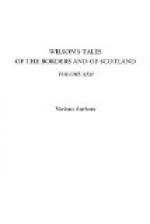“Yes, Walter,” he added, “you have by these words redeemed yourself, and I will take them as an offering of your willingness to accept my legacy; but, remember, I extort no promise, which might reduce the value of a young woman’s affection,—a gift to be accepted for its own sake.”
“I am content,” said Walter.
“And I am satisfied,” added the uncle. “But here is wine on the table,” he continued, as he turned his eye in the direction of a decanter of good claret, just as if Rachel had, by her art of love, anticipated what he wished at this moment. “Ah, Walter, if she shall watch your wants as she has done mine, you will live to feel that you cannot want her, and live; so fill up a glass for me, and one for yourself, that we may drink to the happiness of the dear girl when, after I am dead, she shall become your wedded wife.”
“With all and sundry lands, tenements, hereditaments, and so forth,” cried Walter, with a laugh which might pass as genuine, and which was responded to by a chuckle from the dry throat of the uncle, which certainly was so.
So the pledge was taken; and Walter Grierson went away, leaving the old merchant-burgess as happy as any poor mortal creature can be when so near the term of his departure. Such is our way of speaking; and yet we are forced to admit, that at no period of life, however near the ultimate, abating the advent of the great illumination which breaks like a new dawn upon the internal sense of a favoured few, can you say that the hold of this world upon the spirit is ever renounced. Whether the young man was as happy, we may not venture to say; but this we might surmise, even at this stage of our story, and in reference to the classical proverb, that the bastard might be the beautiful Nisa, and the lawful heir the ill-favoured Mopsus.
These things we may leave to development; and with a caution to the reader not to be over-suspicious, we will follow our Nisa, Rachel Grierson, as she proceeds from the house of the merchant-burgess up the High Street, at a period of the evening of the same day when the shadows of the tall lands wrapped the crowds of loiterers and passengers almost in utter darkness; not that she chose this time for any purpose of secrecy,—for she had no secret, except that solitary one which every young woman has, and holds, up to the minute of conviction, that she is engaged, after which it becomes a flame blown by her own breath,—but simply because it suited the routine of her duties. Her night-cloak kept her from the cold, and the panoply of her virtue secured her from insult; so, threading her way amidst the throng, she arrived at the head of the old winding street called the West Bow, where, at a projection a little to the north of Major Weir’s Entry, she mounted a narrow stair. On arriving at a door on the third landing-place, she tapped gently, and in obedience to a shrill voice, which cried “Come in,” she lifted the latch, and entered a small




